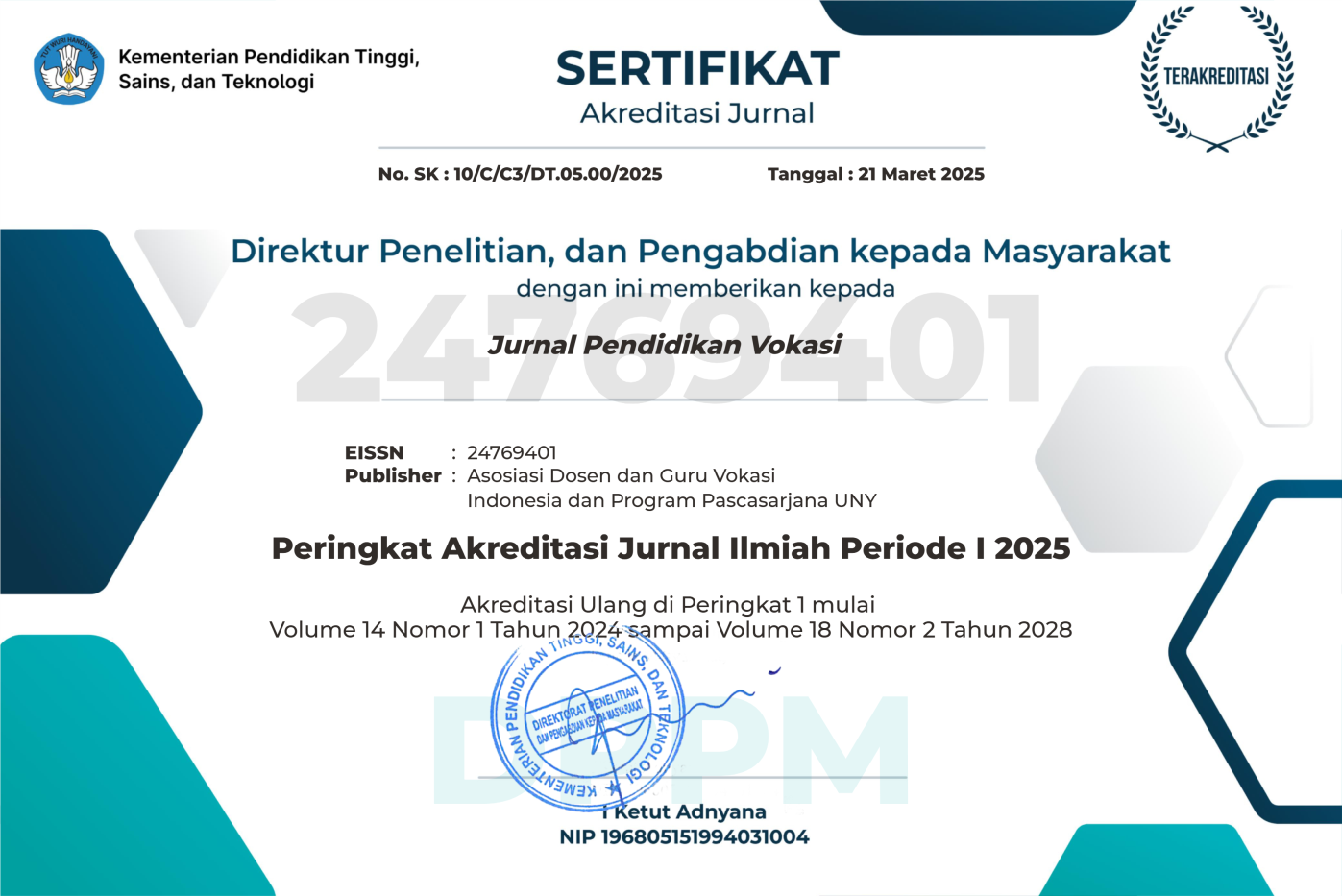Transformation of vocational skills for doormat craftsmen from persons with disabilities using assistive technology
DOI:
https://doi.org/10.21831/jpv.v12i3.54983Keywords:
Assistive technology, doormat craft, persons with disabilities, vocational skillAbstract
References
Bartram, T., & Cavanagh, J. (2019). Re-thinking vocational education and training: Creating opportunities for workers with disability in open employment. Journal of Vocational Education & Training, 71(3), 339–349. https://doi.org/10.1080/13636820.2019.1638168
Beyer, S., Brown, T., Akandi, R., & Rapley, M. (2010). A comparison of quality of life outcomes for people with intellectual disabilities in supported employment, day services and employment enterprises. Journal of Applied Research in Intellectual Disabilities, 23(3), 290–295. https://doi.org/10.1111/j.1468-3148.2009.00534.x
Collins, J. C., & Collet-Klingenberg, L. (2018). Portable electronic assistive technology to improve vocational task completion in young adults with an intellectual disability: A review of the literature. Journal of Intellectual Disabilities, 22(3), 213–232. https://doi.org/10.1177/1744629516689336
Csillag, S., Gyori, Z., & Svastics, C. (2019). Long and winding road? Journal of Enterprising Communities: People and Places in the Global Economy, 13(1/2), 42–63. https://doi.org/10.1108/JEC-11-2018-0097
Ebuenyi, I. D., Rottenburg, E. S., Bunders-Aelen, J. F. G., & Regeer, B. J. (2020). Challenges of inclusion: a qualitative study exploring barriers and pathways to inclusion of persons with mental disabilities in technical and vocational education and training programmes in East Africa. Disability and Rehabilitation, 42(4), 536–544. https://doi.org/10.1080/09638288.2018.1503729
Foley, K.-R., Dyke, P., Girdler, S., Bourke, J., & Leonard, H. (2012). Young adults with intellectual disability transitioning from school to post-school: A literature review framed within the ICF. Disability and Rehabilitation, 34(20), 1747–1764. https://doi.org/10.3109/09638288.2012.660603
Georgiadou, I., Vlachou, A., & Stavroussi, P. (2022). Quality of life and vocational education service quality in students with intellectual disability. International Journal of Developmental Disabilities, 68(5), 681–691. https://doi.org/10.1080/20473869.2021.1887435
Gupta, J., & Vegelin, C. (2016). Sustainable development goals and inclusive development. International Environmental Agreements: Politics, Law and Economics, 16(3), 433–448. https://doi.org/10.1007/s10784-016-9323-z
Hoelman, M. B., Parhusip, B. T. P., Eko, S., Bahagijo, S., & Santono, H. (2015). Panduan SDGs: Untuk pemerintah daerah (kota dan kabupaten) dan pemangku kepentingan daerah. International NGO Forum on Indonesian Development. https://www.batukarinfo.com/system/files/Buku_PANDUAN-SDGs.pdf
Kementerian Perencanaan Pembangunan Nasional/Badan Perencanaan Pembangunan Nasional (BAPPENAS). (2020). Metadata indikator: Tujuan Pembangunan Berkelanjutan (TPB)/Sustainable Development Goals (SDGs) Indonesia. Kedeputian Bidang Kemaritiman dan Sumber Daya Alam, Kementerian Perencanaan Pembangunan Nasional/Badan Perencanaan Pembangunan Nasional. https://sdgs.bappenas.go.id/website/wp-content/uploads/2020/10/Metadata-Pilar-Sosial-Edisi-II.pdf
Kisanga, D., Wambura, D., & Mwalongo, F. (2018). Exploring assistive technology tools and e-learning user interface in Tanzania ' s vocational education institutions. International Journal of Education and Development Using ICT, 14(3), 50–71. https://www.learntechlib.org/p/188281/
Mandrysz, W. (2020). Community-based social economy–social capital and civic participation in social entrepreneurship and community development. Management Dynamics in the Knowledge Economy, 8(1), 81–93. https://core.ac.uk/download/pdf/289277578.pdf
Miles, M. B., & Huberman, A. M. (1994). Qualitative data analysis (2nd ed.). SAGE Publication. https://vivauniversity.files.wordpress.com/2013/11/milesandhuberman1994.pdf
Nofiani, N. S., Kasnawi, M. T., & Hasbi. (2022). Partisipasi kerja penyandang disabilitas: Keterkaitan faktor internal dan eksternal. Sosio Informa: Kajian Permasalahan Sosial Dan Usaha Kesejahteraan Sosial, 8(1), 27–46. https://doi.org/10.31595/inf.v8i1.2979
Paris, D. G., & Miller, K. R. (2018). Wearables and people with disabilities. In Information Resources Management Association (USA) (Ed.), Wearable Technologies: Concepts, Methodologies, Tools, and Applications (pp. 833–849). IGI Global. https://doi.org/10.4018/978-1-5225-5484-4.ch035
Rakhmani, V. A., & Bhinekawati, R. (2020). The impact of entrepreneurial orientation of social entrepreneurship towards social capital and organization performance: A case study of precious one. International Journal of Business Studies, 4(2), 56–68. https://doi.org/10.32924/ijbs.v4i2.106
Smythe, T., Adelson, J. D., & Polack, S. (2020). Systematic review of interventions for reducing stigma experienced by children with disabilities and their families in low" and middle"income countries: State of the evidence. Tropical Medicine & International Health, 25(5), 508–524. https://doi.org/10.1111/tmi.13388
Trani, J.-F., & VanLeit, B. (2010). Increasing inclusion of persons with disabilities: Reflection from disability research using the ICF in Afghanistan and Cambodia (11). Leonard Cheshire Disability and Inclusive Development Centre. http://www.ucl.ac.uk/lc-ccr/centrepublications/workingpapers
Verdugo, M. A., Fernández, M., Gómez, L. E., Amor, A. M., & Aza, A. (2019). Predictive factors of quality of life in acquired brain injury. International Journal of Clinical and Health Psychology, 19(3), 189–197. https://doi.org/10.1016/j.ijchp.2019.06.004
Wicker, M. R., Davis, T. N., & Hrabal, J. M. (2022). Use of technology in vocational skills training for individuals with intellectual and developmental disabilities: A systematic review. Education and Training in Autism and Developmental Disabilities, 57(2), 135–150. https://www.proquest.com/openview/7ef185770555151278b6ec146ca64f84/1?pq-origsite=gscholar&cbl=2032023
Downloads
Published
How to Cite
Issue
Section
Citation Check
License
The authors submitting a manuscript to this journal agree that, if accepted for publication, copyright publishing of the submission shall be assigned to Jurnal Pendidikan Vokasi. However, even though the journal asks for a copyright transfer, the authors retain (or are granted back) significant scholarly rights.
The copyright transfer agreement form can be downloaded here: [JPV Copyright Transfer Agreement Form]
The copyright form should be signed originally and sent to the Editorial Office through email to jpvokasi@uny.ac.id
Jurnal Pendidikan Vokasi by http://journal.uny.ac.id/index.php/jpv is licensed under a Creative Commons Attribution-ShareAlike 4.0 International License.

















